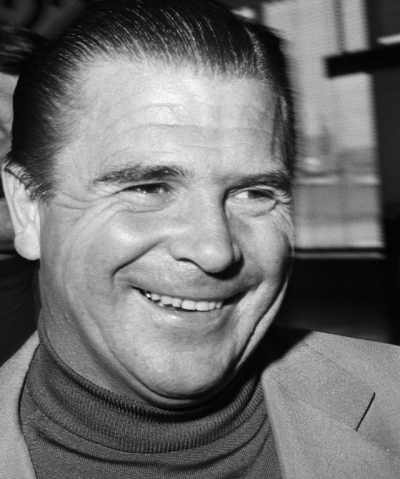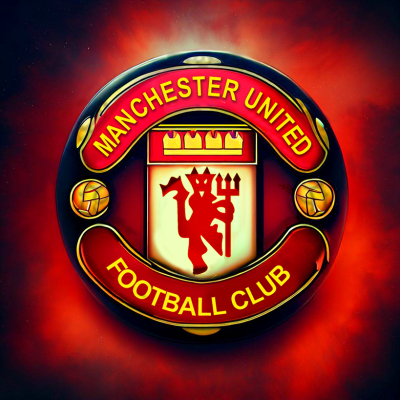Football News: Legends of Football Number 2: Ferenc Puskas

Image from: biography.com
Ferenc Puskas 'The Little Cannon'
Even at the peak of his powers, Hungarian maestro Puskas did not have the look of a footballer. While he had a magic wand for a left foot, up there with the very best, he had that Maradona build, short and, many would say, fat. The kind of physique that would ensure almost every academy would totally ignore him. Maybe that led to people underestimating him throughout his career? Certainly it led to many doing so after he retired, as George Best was fond of telling people:
"I was with (Bobby) Charlton, (Denis) Law and Puskas, we were coaching in a football academy in Australia. The youngsters we were coaching did not respect him, including making fun of his weight and age. We decided to let the guys challenge a coach to hit the crossbar 10 times in a row, obviously they picked the old fat one. Law asked the kids how many they thought the old fat coach would get out of 10. Most said less than five. I said 10. The old fat coach stepped up and hit nine in a row. For the tenth shot he scooped the ball in the air, bounced it off both shoulders and his head, then flicked it over with his heel and cannoned the ball off the crossbar on the volley. They all stood in silence then one kid asked who he was, I replied, 'To you, his name is Mr. Puskas.'"
Ferenc Puskas was actually born as Ferenc Purczeld in 1927, but his father, Ferenc senior, 'Magyarised' the family name in 1937. Senior was a coach at a local club, Kispest AC and Ferenc junior was signed up to the youth teams there under the age of Miklos Kovacs until he reached the age of 12. That was because teams in Hungary could not sign youth players under that age, so a bit of chicanery was employed. Oddly enough future international team-mate Joszef Bozsik was in the same youth team and lived in the same building.
Even as a youngster Puskas stood out, making his debut for Kispest at the age of just 16 in November 1943 against Nagyvaradi AC and became a first team regular by the end of the season. Less than two years later, when still only 18, Puskas made his international bow in a 5-2 win over Austria in August 1945. He went on to score 2 hattricks against Austria in his career. By the age of 21 he was not just the top scorer in the Hungarian league, but Europe's top scorer with 50 goals.
1949 brought change to Kispest AC, Puskas was now playing for the Ministry of Defence, who turned the team into the army's team and their players now were given military ranks. Puskas rose through the ranks to reach major, hence his later nickname of 'The Galloping Major'. The club's name was changed to Budapest Honved, better known as just Honved, and it now was able to use conscription to pick up some of the best players in Hungary. Puskas went on to win 5 Hungarian league titles, top scoring 3 more times.
It was international football that really saw Puskas and his marvellous left foot enter into footballing folklore. The Hungary side he played for was so good that people would call them the 'Mighty Magyars', the 'Marvellous Magyars', the 'Magnificent Magyars' or the 'Magical Magyars'. If it began with an M, and was a superlative, people would use it to relate to Hungary at this time. In Hungary it was simply known as the 'Golden Team'. With them being at that time nominally amateur, the Magyars earned their golden tag in the Olympics of 1952 as they went on what was to become a 32 match unbeaten run. Puskas would score 4 goals in the tournament, including the opener in the final's 2-0 win over Yugoslavia.
The following year they won the Central European Championship, beating Italy 3-0 in the final at the Stadio Olimpico in Rome. Puskas scored 10 goals in that tournament including a double over the Italians in the final. However 1953 is better remembered for a mere friendly, at least in Britain, as that is when they really took the world's attention as they faced England in a friendly at Wembley, with England then unbeaten by anyone outside of the British Isles at Wembley. Puskas was firmly ensconced as national captain of a team that used a brand new playing style and formation.
Hungary shocked the world, giving a display of football that was breathtaking on their way to a 6-3 win. Puskas notched 2, completely destroying then England captain Billy Wright in the process. Tom Finney was sat in the stands watching and said afterwards: "I came away wondering to myself what we had been doing all these years." Finney found out the following year for himself just how good the Magyars were, as he lined up for an England team in a friendly in Budapest. This time England were demolished 7-1 as Puskas once again scored a brace.
All of that saw them enter the 1954 World Cup as firm favourites, still unbeaten and looking a class above anyone else in world football. Sure enough, Hungary started off with a 9-0 victory over South Korea, followed by an 8-3 victory over West Germany with Puskas adding 3 goals in those 2 games. Sadly a tackle by Werner Liebrich in the win over West Germany left Puskas with a hairline fracture in his ankle, ruling him out of the World Cup. Despite the injury, he returned to the side for the final, a rematch with the Germans and scored the opening goal. While the injury hampered him clearly, he still had a late equaliser controversially ruled out for offside, which left West Germany to lift the trophy.
Honved entered the European Cup in 1956 being drawn against Athletic Bilbao (who, at the time, were forced to use the Spanish name of Atletico Bilbao by Spanish dictator Franco), losing the first leg in Bilbao 3-2. While they were away the Hungarian Revolution took place, which saw them stranded in Spain. The return leg was re-arranged to take place at the Heysels Stadium in Brussels where, despite Puskas scoring, Honved could only get a 3-3 draw, seeing them out of the competition with a 6-5 aggregate defeat. With Russian tanks busy crushing the revolution, the players decided not to return to Hungary and instead to try and get their families out to safety.
The team doctor for Hungary and Honved, Dr Tomas Fried, helped Puskas' wife to escape the country when he brought his own family out. He knew how important family was to the striker, as he would later say that Puskas was a family man who would go shopping to buy dolls for his daughter when the team were playing away games, while his teammates would be heading to bars. However defection would not go well initially for Puskas as his refusal to return to Hungary saw FIFA slap a 2 year playing ban on him. Those 2 years saw him waste what could well have been his peak years and putting on weight as he lived in Austria and then Italy.
Before the ban had been handed out, both AC Milan and Juventus had tried to sign him, but the ban ended their interest, even when he approached them following its end. Both clubs decided he was too old, at 31, and too fat, to take a risk on. The Manchester United squad ravaged by the Munich Air Disaster stepped in to try and sign him, with stand-in manager Jimmy Murphy desperate to add him to the team. However the English FA were extremely strict on rules regarding foreign footballers and Puskas' lack of English saw the deal fall through. Sadly. What an opportunity missed that was for English football.
Puskas moved to Spain to play a few unofficial games for Espanyol but they offered no contract. Emil Oestreicher had been financial secretary with Honved before taking a role as Real Madrid's technical director and he persuaded the Spanish giants to take a chance on Puskas. If ever a gamble paid off it was this one, as Puskas hit the ground running, scoring 4 hattricks in his first season and quickly acquiring the nickname of 'The Little Cannon' from the adoring Madridistas.
Goals flowed as his partnership with Alfredo di Stefano clicked, Puskas going on to play 180 league games in the 8 years he was with them, scoring 324 goals in 372 matches, 35 goals in 39 European Cup games as he won the Pichichi (league top scorer) 4 times and scored 20 or more goals in each of his first 6 seasons. He was helped into Madrid fans affections with his two hattricks against Barcelona in 1963, one at the Bernabeu and one in the Camp Nou. His most famous goals being the 4 he notched in a 7-3 European Cup final win over Eintracht Frankfurt in Glasgow, with many Glaswegians still talking about that performance to this day. It almost completely overshadowed di Stefano's hattrick.
Puskas did so well that he was given Spanish nationality in 1962 so that he could play for them in the World Cup. That did not quite work out as expected, as he played 4 times for Spain, three at the World Cup, but failed to notch a single goal, surprisingly. La Liga was won 5 times in a row with Puskas spearheading the team and he scored both goals as Madrid beat Sevilla 2-1 in the final of the Copa del Generalisimo in 1962.
In 1967, at the age of 40, Puskas hung up his boots, only to receive a telegram from a non-league side in England, South Liverpool. They were to play in an annual fundraising match in Holly Park and they sent him a tongue-in-cheek request to play. Puskas sent a telegram back saying merely: "All I wait is you send me plane ticket". Needless to say his appearance drew a sell-out crowd.
Following his retirement from playing, Puskas moved into coaching, but failed to have the same level of success, despite managing in Europe, North America, South America, Africa, Asia and Australia. He did guide Panathinaikos to the 1971 European Cup final and to a Greek title the following year, plus leading South Melbourne Hellas to the 1991 National Soccer League title. Other than that though, there were no significant successes. That did not stop Hungary giving him a pardon in 1993 to take charge of the national team for 4 games.
Sadly the great man was diagnosed with Alzheimer's disease in 2000 and retired in his home country for treatment. To pay for his treatment, he was forced to auction off all his medals, this despite a 2005 'fundraiser' game that Real Madrid took part in, played in Budapest. The funds raised saw the family given just £7,000 while Real Madrid were paid the sum of £892,000! In 2006 Puskas passed away after contracting pneumonia and the Little Cannon would fire no more.
"I believe that if a good player, he should have the vision to spot at least 3 options. Puskas always saw at least 5", said Hungary teammate Jeno Buzanszky.
For the accompanying player profile on Puskas: Ferenc Puskas profile.
For part 1 of the Legends of Football series on Rene Higuita, click here: Legends of Football, Part 1: Rene Higuita
Written by Tris Burke October 26 2017 18:45:06


